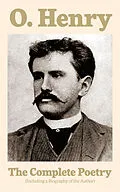This carefully crafted ebook: "The Complete Poetry (Including a Biography of the Author)" is formatted for your eReader with a functional and detailed table of contents.
William Sydney Porter (1862-1910), known by his pen name O. Henry, was an American writer. O. Henry's works are known for their wit, wordplay, warm characterization, and surprise endings.
Table of Contents:
A Contribution
Chanson De Bohême
Drop a Tear in This Slot
Hard to Forget
Nothing to Say
Tamales
The Lullaby Boy
The Murderer
The Old Farm
The Pewee
Two Portraits
Vanity
Sleeping
Fancies
Trusting
Thoughts
Thinking
The Crucible
Biography of O. Henry
Zusammenfassung
Show off your love of Batman™ with this set of pocket journals celebrating the Dark Knight’s iconic history.
Since he burst onto the scene in Detective Comics #27 in 1939, Batman has taken down countless criminals and villains with his unwavering grit and cunning investigative skills, garnering the admiration of comic book fans across multiple generations.
Now fans can jot down their detective notes in these pocket journals! Each journal sixty-four pages of ruled, acid-free, high-quality paper that take both pen and pencil nicely to invite a flow of inspiration. Featuring art inspired by Batman throughout his legendary history, this set of pocket journals is a must-have for fans of the Caped Crusader™.
Leseprobe
CHAPTER SIX
The Shadowed Years
Table of Contents
When O. Henry left Houston, never to return, he left because he was summoned to come immediately to Austin and stand trial for alleged embezzlement of funds while acting as paying and receiving teller of the First National Bank of Austin. The indictments charged that on October 10, 1894, he misappropriated $554.48; on November 12, 1894, $299.60; and on November 12, 1895, $299.60.
Had he gone he would certainly have been acquitted. He protested his innocence to the end. "A victim of circumstances" is the verdict of the people in Austin who followed the trial most closely. Not one of them, so far as I could learn after many interviews, believed or believe him guilty of wrong doing. It was notorious that the bank, long since defunct, was wretchedly managed. Its patrons, following an old custom, used to enter, go behind the counter, take out one hundred or two hundred dollars, and say a week later: "Porter, I took out two hundred dollars last week. See if I left a memorandum of it. I meant to." It must have recalled to O. Henry the Greensboro drug store. Long before the crash came, he had protested to his friends that it was impossible to make the books balance. " The affairs of the bank," says Mr.' Hyder E. Rollins, of Austin, "were managed so loosely that Porter's predecessor was driven to retirement, his successor to attempted suicide."
There can be no doubt that O. Henry boarded the train at Houston with the intention of going to Austin. I imagine that he even felt a certain sense of relief that the charge, which had hung as a dead albatross about his neck, was at last to be unwound, and his innocence publicly proclaimed. His friends were confident of his acquittal and are still confident of his innocence. If even one of them had been with O. Henry, all would have been different. But when the train reached Hempstead, about a third of the way to Austin, O. Henry had had time to pass in review the scenes of the trial, to picture himself a prisoner, to look into the future and see himself marked with the stigma of suspicion. His imagination outran his reason, and when the night train passed Hempstead on the way to New Orleans, O. Henry was on it.
His mind seems to have been fully made up. He was not merely saving himself and his family from a public humiliation, he was going to start life over again in a new place. His knowledge of Spanish and his ignorance of Honduras made the little Central American republic seem just the haven in which to cast anchor. How great the strain was can be measured in part by the only reference of the sort, so far as I know, that O. Henry ever made to his life in the little Latin American country: "The freedom, the silence, the sense of infinite peace, that I found here, I cannot begin to put into words." His letters to Mrs. Porter from Honduras show that he had determined to make Central America his home, and that a school had already been selected for the education of his daughter.
How long O. Henry remained in New Orleans, on his way to or from Honduras, is not known; long enough, however, to draw the very soul and body of the Crescent City into the stories that he was to write years afterward. With his usual flair for originality, he passes by Mardi Gras, All Saints' Day, Quatorze Juillet, and crevasses; but in "Whistling Dick's Christmas Stocking," "The Renaissance of Charleroi," "Cherchez La Femine," and "Blind Man's Holiday," he has pictured and interpreted New Orleans and its suburbs as only one who loved and lived the life could do.
It is probable that he merely passed through New Orleans on his way to Honduras and took the first available fruit steamer for the Honduran coast, arriving at Puerto Cortez or Criba or Trujillo. At any rate, he was in Trujillo and was standing on the wharf when he saw a man in a tattered dress suit step from a newly arrived
